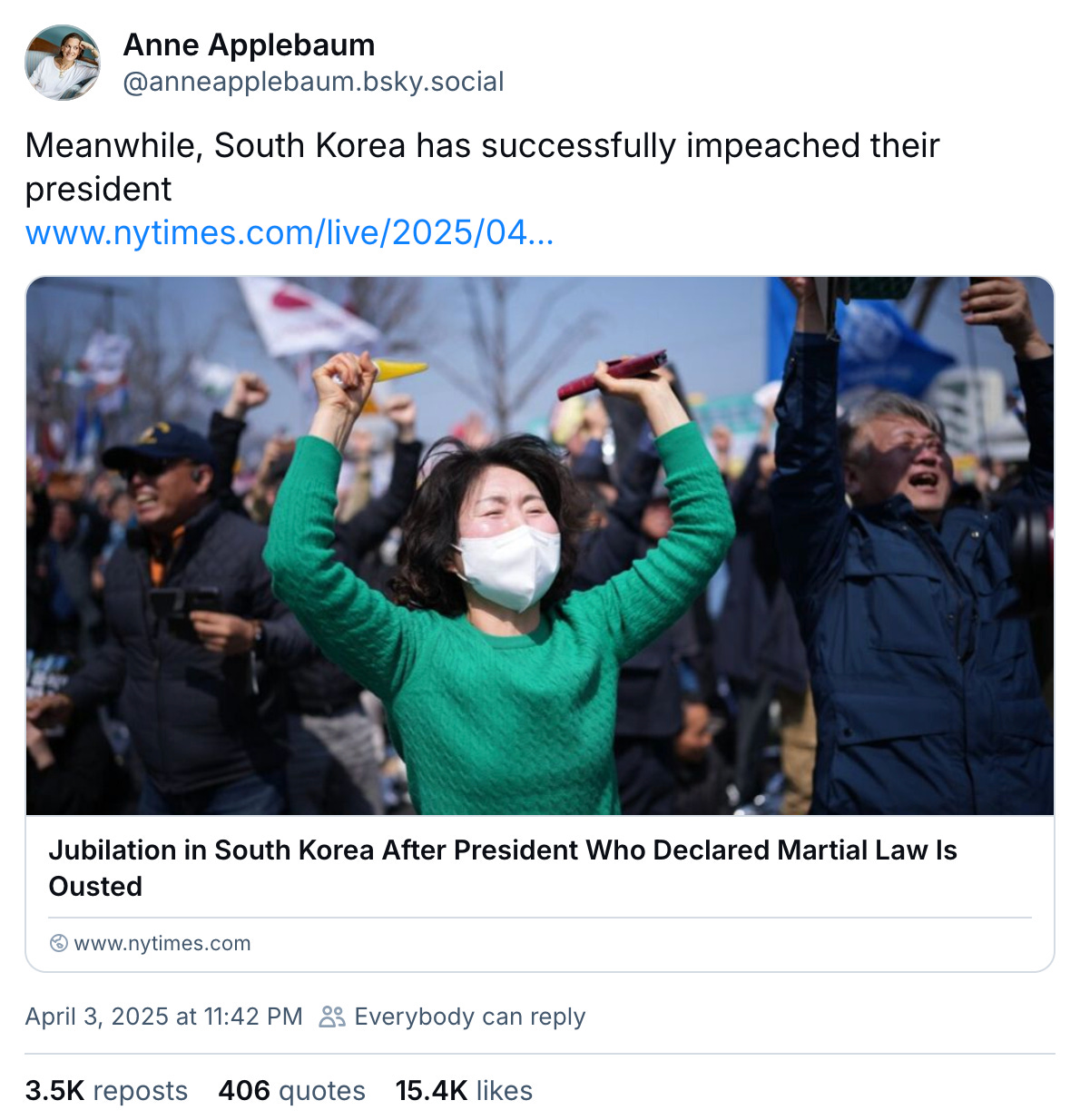In this episode of Talking About the Future, I talk with political scientist Lucan Way about his recent essay (with Steven Levitsky) in Foreign Affairs arguing that the US is on the path to authoritarianism. Professor Way is Distinguished Professor of Democracy in the Department of Political Science at the University of Toronto, Co-Director of the Petro Jacyk Program for the Study of Ukraine, and a Fellow of the Royal Society of Canada. He is the author (with Steven Levitsky) of Competitive Authoritarianism: Hybrid Regimes after the Cold War, Pluralism by Default: Weak Autocrats and the Rise of Competitive Politics, and (with Steven Levitsky) Revolution and Dictatorship: The Violent Origins of Durable Authoritarianism. The interview was conducted before Trump’s announcement last week of across-the-board tariffs and before the nationwide protests last weekend against the Trump administration. You can listen to our full conversation using the audio player above or on most podcast platforms. Excerpts from our conversation, edited for clarity, are below.
So, Lucan, in your opinion, as of now, April 2025, is the US a democracy?
LW: No. The piece you refer to that Steve Levitsky and I wrote was written before the inauguration. Pretty much everything that we predicted has turned out to be the case. There's a few things we didn't foresee—such as Musk—but it's only been on the bad side of the ledger, so to speak. So I think we've definitely in the last month or so really crossed the line into what we call “competitive authoritarianism.”
That's hard to hear. American democracy has always been flawed, but I believed in it. What would make you classify the US today as not a real democracy?
LW: So it's an important question. I think that the most straightforward measure that we can think of is the fact that it's now costly to engage in democratic political opposition. In a democracy, as the type of regime that exists in the United States basically since the 1970s, one could engage in any form of opposition—legal opposition, peaceful opposition—without fear of increased auditing by the IRS, without fear, if you're a business person, of not getting government contracts or being targeted for investigation or losing business opportunities. And that is just simply no longer the case right now. So now, across the board, we see that opposing Trump comes with enormous risk....
In your Foreign Affairs article, you said that we're on a path to “competitive authoritarianism.” What exactly is that? What are some examples of competitive authoritarian regimes?
LW: Competitive authoritarianism is a type of authoritarianism where you have elections, regular elections, opposition is above board, allowed to run, sometimes elections are genuinely competitive, but in which there's all sorts of abuse, mostly legal, involving things like threats to audit opposition donors, harassment of media with things like defamation suits or other kinds of legal actions that really make for an uneven playing field between the incumbent and opposition.
So examples today are cases like Hungary, Turkey, India. These are all examples of cases in which there are still regular elections. I mean, we'll see what happens in Turkey because they have actually banned the major opposition candidate, so it almost seems to be getting worse there. But in past elections the vote count itself has been fairly aboveboard, and the reason why the opposition, according to most observers, lost the last election wasn't because of authoritarian abuse. It was because the opposition chose the wrong candidate. So these are still very much authoritarian cases, but in which elections continue to take place and are competitive....
What is life under a competitive authoritarian regime like? Do any of these regimes exhibit good governance outside of the fact of being basically undemocratic?
LW: I mean, for the most part, it's true that—I think Tom Pepinsky has been one of those who notes that life under authoritarianism for a lot of people is exactly the same. But I just want to emphasize that this does represent a profound shift in politics. I think for example a lot of people—this is not just the elite—donate to political parties around election time. We've never been in a situation where we feel like we need to hide who we're donating to or worry that if we donate, we're more likely to be audited by the IRS. That's a completely novel circumstance and something we're heading towards. We already see right now that donors to the Democratic Party are scared. They have expressed fear of retribution, of being investigated, of losing business opportunities. So what we've seen, in fact, is that increasingly donors to the Democratic Party have either stopped donating right now—I mean, it's still early in the election season, so that might pick up, but we've seen a kind of a chill on Democratic Party donations—or are increasingly demanding anonymity. Some of them are moving their assets abroad. These are the kind of behaviors you see in an authoritarian regime, which are occurring right now. And this is just a little over two months since the inauguration....
You wrote that opposition to authoritarianism can be grueling. What does the research say about what we have to do to resist the trend and potentially reverse it?
LW: There’s a lot we can do on a number of different levels. First of all, on a background level, I think it's important for everyone to pay for mainstream media, because part of what allows these things to happen is the demise of fact-based media. That's something all of us can do by paying for subscriptions to The New York Times or The Wall Street Journal or whatever, it doesn't really matter....
What else can we do?
LW: On a bigger level, in competitive authoritarian regimes, basically opposition has to operate along two tracks. The first is the legal track, which means running in elections, filing lawsuits, going through the legal system, all that kind of stuff, which opposition has to do in normal democracies. Obviously, the fate of democracy in the United States is going to hinge heavily on their ability to do things they’ve always done—run good candidates, run effective campaigns, come up with good messaging. But there's also the second track which is also uniquely important, which is civil disobedience and protests. You mentioned 2028. Imagine a worst case scenario in which the election is stolen outright, and, for whatever reason, the legal system is insufficient to block that. Well, then, that would be a circumstance in which mass protests would clearly have a role to play in bolstering a free and fair election. I think that's hugely important.
I also think it's important to emphasize that while there's been a lot of passivity, and the capitulation of the powerful is hugely depressing, there were actually more protests in the last two months than there were in 2017. In 2017, as people may remember, you saw this upsurge in large-scale protests—the Women's March and stuff—the visibility of pink hats and the like was much more salient back then. But now, in terms of the number of protests, they've actually far exceeded what there were in early 2017. They're just much lower level. If there was that much passivity, then the Republican Party wouldn't be terrified to have these town halls. They clearly are terrified. They clearly are nervous. They're hiding themselves from the public.
We're in a situation right now where there's clearly a massive demand among large numbers of people for more concerted opposition. So far, the Democratic Party hasn't really supplied that opposition, but at some point, someone is going to do it. So that's why I feel a little optimistic. But it is hugely important. I think people have to resist. The Trump administration has to at least be forced to break a sweat in its attempt to implement authoritarianism.
One great way to support independent media—and to make possible more podcasts like this—is to become a paid subscriber of Telling the Future. You can also support my work by rating Talking About the Future on your favorite podcast platform and by sharing this post with others.












